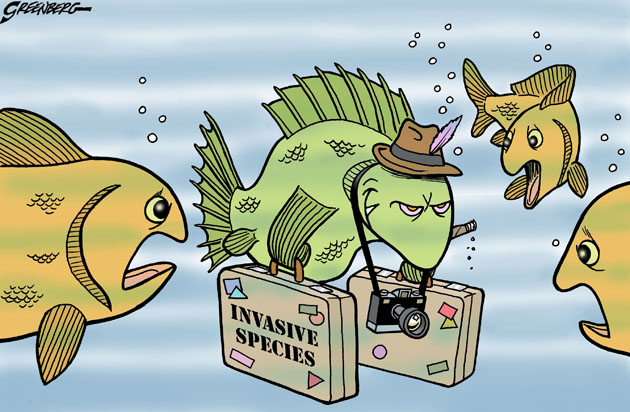 |
| Source: http://www.greenrooftechnology.com/Pictures%20from%20JBi/Biodiversity.jpg |
Biodiversity is defined as the variety of life in a particular habitat or ecosystem. Naturally, humanity depends upon the vast biodiversity that Mother Nature has to offer. Birds offer a natural pest control, killing off mosquitoes and locusts that would otherwise do harm to our health and crops. Honey bees provide pollination to a numerous amount of plants, which sprout fruit and other benefits for our survival. There are so many connections and symbiotic relationships that are too great to list, but does it go without consequence to alter genetic information to better suit our needs, or should that ideology be entirely off the table?
I read an excerpt from Vandana Shiva's
Tomorrow's Biodiversity: "What is Biodiversity and Why is it so Important?" and she argues the point that bioengineering can erode biodiversity to where it can no longer provide benefits as nature intended. "Industry is reorganizing itself as the 'life sciences' industry, changing property laws, environmental laws and trade policies to create markets for genetically engineered products and to establish monopolies in the vital sectors of food and medicine" (Shiva 39). She continues, stating that "Humankind is one among millions of other species. It does not have a right to push other species to extinction, or to manipulate them for greed, profit, and power without concern for their well being." (Shiva 40). I believe that Shiva's word may ring true to some extent, however I don't agree with her entirely. For instance, the hot topic nowadays is genetically modified organisms (GMOs), specifically local produce, and how their considered "vile and toxic" to local communities in their entirety. When in actuality, they are almost a blessing in disguise. Take orange groves for example; without the crop being genetically modified, ripe and plump oranges that would typically come with a harvest would be slightly shriveled and about the size of a golf ball. Flash freezes that destroy thousands of crops in Florida, costing the state millions of dollars, can be instantly averted by modifying a gene to protect it from such occurrences. The info on GMO's is heavily misinformed, and by instilling a sense of urgency I believe that Shiva falls far from reaching her intended mark.
 |
| Source: http://theinstitute.ieee.org/img/blogiStockphoto16682275-1383665693520.jpg |
However, biodiversity still is an imperative design which still must be held even with genetic modification. "Species diversity is the species richness of an ecosystem... all cultures have ways of organizing life forms along lines of difference" (Shiva 42). Although genetic modification brings about many benefits, changing a gene and releasing that modified animal back into the environment can be a very catastrophic and costly mistake. "Ecological interactions between diverse species become the key measure for ecosystem diversity" (Shiva 42). Biodiversity is an absolute necessity for many organisms, including ourselves. Each ecosystem a person may come across can be radically different depending on the region they are located in. Modifying an organism to the point where it is not environmentally friendly as its past counterparts may have been can be devastating, as the biome would have to adapt to this new organism. If human beings continue to be ignorant, everything as a whole could suffer entirely in the next couple of centuries.
 |
| Source: http://b.static.trunity.net/files/226901_227000/226922/thumbs/reef4436_-_flickr_-_noaa_photo_library_438x0_scale.jpg |
Humanity is perfectly capable of sustaining itself as well as the world around them. Genetically modifying organisms can be beneficial if used correctly, however we should properly run tests to make sure the environment isn't affected maliciously. If the proper way of thinking were to revolve around this procedure, humanity can lessen its overall overhead of effecting the environment.











